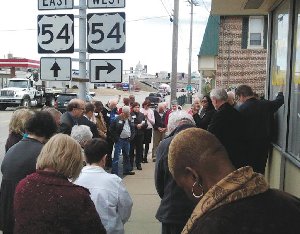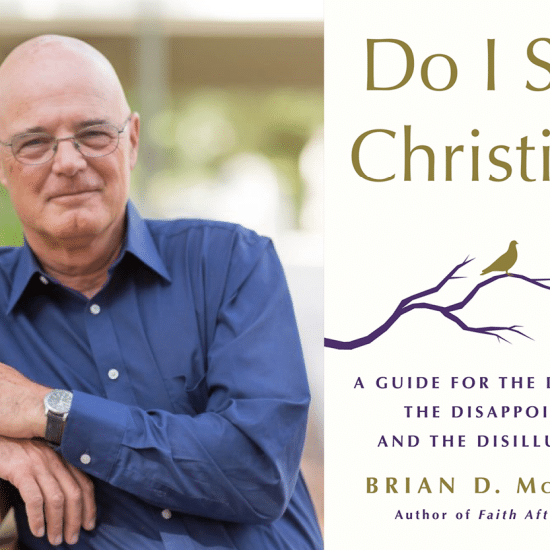JEFFERSON CITY (RNS) — Believers in Missouri aren't the only ones pushing for short-term-credit reform. People of faith across the country are trying to rein in loan practices they believe take advantage of borrowers often least able to pay.

Clergy and staff from across Missouri gather in front of a payday loan shop in Jefferson City to pray for efforts to cap the rate lenders can charge in Missouri. The average annual percentage rate in the state is about 444 percent. Religious leaders are pushing for a ballot initiative to cap the rate at 36 percent. (RNS photo by W.T. Edmonson)
|
They point to people like Amanda of Jefferson City, Mo., who took out a short-term loan — often called a payday advance — to pay a bill. She ended up taking out another loan to cover the first. She soon found herself juggling three loans and spiraling further into debt.
“The faith community has been really instrumental in predatory lending reform, first calling attention to the abusive nature of predatory lending and then in leading the effort to stop it,” Rachel Anderson of the Center for Responsible Lending said.
People of faith have and are currently working to reform payday lending laws, a cause some have taken to the federal level.
Payday loan trap
Payday advances were designed to be small, short-term loans to be used for emergencies. Most are granted for 14 to 30 days, are fee-based and average triple-digit interest rates.
The Durham, N.C.-based Center for Responsible Lending estimates 12 million people get trapped in debt every year because of high-interest lenders. But the payday industry counters that restrictions on it would cut access to credit to some consumers.
“But the issue is that it’s marketed as financial help,” Diane Standert of the Center for Responsible Lending said.
A moral issue
The center taps into the anti-usury view many faith traditions take. Rachel Anderson, spokesperson for its faith-based program, points to admonitions in the Jewish Torah, the Christian Old and New Testaments and the Qur’an. While lending was not prohibited, charging interest often was.
"Our strategy has always been that we want the faith community to lead this effort," explained Molly Fleming-Pierre, spokesperson for Communities Creating Opportunities, a Kansas City coalition of faith groups and businesses. CCO and Missouri Faith Voices, a coalition of faith leaders, are using the moral argument and pointing out economic pitfalls to garner support for a referendum on Missouri’s Nov. 4 ballot.
The faith community in Texas helped changed state law in 2011 and is pushing to get additional reforms made.

Jeanie McGowan, left, holds the clipboard as a voter signs a petition to cap the rate on short-term loans in Missouri. Leaders from Missouri Faith Voices and Communities Creating Opportunities organized faith leaders to collect voter signatures throughout the state April 18. McGowan is pastor to single adults at First Baptist Church in Jefferson City.(Photo by Vicki Brown)
|
“There were almost no controls or regulations in Texas,” explained Steve Reeves with Texas Faith for Fair Lending and director of the Texas Baptist Christian Life Commission. “Lenders only had to register with the Texas Finance Commission.”
The coalition — primarily comprised of the Texas Catholic Conference; the Baptist General Convention of Texas; Texas Impact, an interfaith group; and the Liberty Institute, a non-denominational, conservative Christian advocacy group — helped push through two bills in 2011.
Texas now requires licensing and oversight of each lender. State changes uphold federal law capping interest rates for military personnel at 36 percent. Lenders now must disclose terms to borrowers and file quarterly reports with the state.
Legislators stopped short of setting a rate cap — the average is about 417 percent — and did not limit the number of times a consumer can roll the loan over. The coalition already has started working on both and is watching the implementation of the new rules.
Calling it “very vocal,” Reeves said, “The faith community in Texas helped make the difference.”
The Catholic Conference in Montana helped spearhead the effort in that state, which, in 2010, resulted in a 36-percent cap on payday loan interest rates.
People of faith in Oklahoma also are beginning to address the issue. Several Baptist groups in that state discussed ways to curb payday lending at the New Baptist Covenant II, a national meeting spearheaded by former President Jimmy Carter in November.
Anderson noted several Jewish groups, including the Jewish Council on Public Affairs, and the Islamic Society of North America also have been involved in payday lending reform.
Making a federal case
Many people of faith hope a new federal agency will be an ally. The Dodd-Frank Wall Street Reform and Consumer Protection Act of 2010 created the Consumer Financial Protection Bureau. President Obama named Rich Cordray as director in January.
Religious leaders from across the country met with agency staff in Washington, D.C., March 21-22 to express concerns about the payday lending industry and to ask the agency to consider the faith voice.
They asked the CFPB to establish a payday lending rule that would allow the federal government to have more control over interest rates, according to Chandra Hayslett, director of communications and marketing for First Baptist Church of Lincoln Gardens in Somerset, N.J., who attended the meeting with Pastor DeForest B. Soaries Jr.
They want the agency to research who receives the loans and the loans’ long-term impact. They’ve asked for a study of the banking industry’s involvement in payday loans, and seek new federal regulations for it.
Religious leaders suggested a complaint section specific to payday loans, and asked the bureau to appoint a contact person for faith-based groups.






